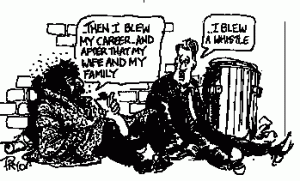 Whistleblowers are heroes. They stand up to fight corruption and fraud and to do what is right. Often it is a lonely battle; the federal False Claims Act and most state whistleblowernlaws “seal” complaints during investigation meaning the whistleblower is precluded from talking about the case. That doesn’t stop a few bad employers from engaging in whistleblower retaliation, the act of punishing or discrediting whistleblowers.
Whistleblowers are heroes. They stand up to fight corruption and fraud and to do what is right. Often it is a lonely battle; the federal False Claims Act and most state whistleblowernlaws “seal” complaints during investigation meaning the whistleblower is precluded from talking about the case. That doesn’t stop a few bad employers from engaging in whistleblower retaliation, the act of punishing or discrediting whistleblowers.
Frequently whistleblowers need documents to prove their case. Critical emails, photos, meeting minutes and recordings. Unfortunately some companies say that taking company property is a crime. In some cases, employers are even able to convince a sympathetic prosecutor to charge a whistleblower with theft of documents.
Take the case of Ivonne Saavdre. In the ultimate act of retaliation, Saavdre not only lost her job as clerk of a local school board, she now faces charges of theft and misconduct in office. The Hudson County Prosecutors Office says she illegally took 367 pages of confidential documents from her former employer.
Saavdre doesn’t deny taking the documents. She claims that her activities were protected because she needed the documents to prove her whistleblower case against the school board. Her fear was that documents necessary for her to prove her complaint would have been destroyed if she didnt act quickly to secure them.
A trial judge denied Saavdre’s motion to dismiss the indictment. A divided 3 judge appellate panel upheld the right of the prosecutor to go forward on the charge but one of the three judges dissented. Now the case is before the New Jersey Supreme Court.
Saavdre says the charges are nothing more than illegal whistleblower retaliation. Said one lawyer in the case, “Start putting these whistleblowers in jail and you’ll stop whistleblowing.”
Several outside parties have now sought permission to file briefs in the Saavdre case with the court. Unfortunately, the New Jersey Attorney General’s Office filed a brief supporting the local prosecutor’s decision to press charges. “There is no right for a plaintiff to freely take what they may,” said Deputy Attorney General Brian Uzdavinis.
While taking the law into your own hands is never a good idea, there seems to be mixed messages coming from the courts, state capitols and Congress. The SEC, for example, has completely different rules on turning over documents taken from an employer.
New Jersey follows a multi-prong balancing test when determining if the taking confidential documents is permissable. Some of the factors include the confidentiality expectations inherent in the documents, how they were taken, what the whistleblower did with the documents after taking them and whether there was a good reason for taking the documents rather than obtaining them through discovery.
In Saavdre’s case, some of the documents admitted contained very sensitive material such as bank account numbers and student records. Ms. Saavdre told her lawyer that she had taken them, however, and the lawyer immediately contacted the board. It appears she wasn’t trying to hide or conceal her actions. It also appears that she didn’t publish sensitive documents or use for any purpose except her lawsuit.
We are certainly disappointed with the court’s action so far. This case gives the New Jersey Supreme Court a rare opportunity to strike a decisive blow against whistleblower retaliation. Affected workers and their lawyers need clear rules. While we do not support stealing from one’s employer, we also don’t think companies should be able to hide illegal conduct by prosecuting concerned employees for taking the very documents that expose corruption and illegal activity.
Whistleblower advocates across the country are following this case as the business community.
—
MahanyLaw represents whistleblowers in SEC, IRS and state and federal false claims actions. We do not represent public sector employees in actions against government agencies. Our goals are simple… protect our clients from illegal whistleblower retaliation and secure the maximum cash award possible for them.
Need more information? Contact attorney Brian Mahany at or by telephone at (direct). All inquiries protected by the attorney – client privilege and kept in strict confidence.
See also our whistleblower retaliation information page.

